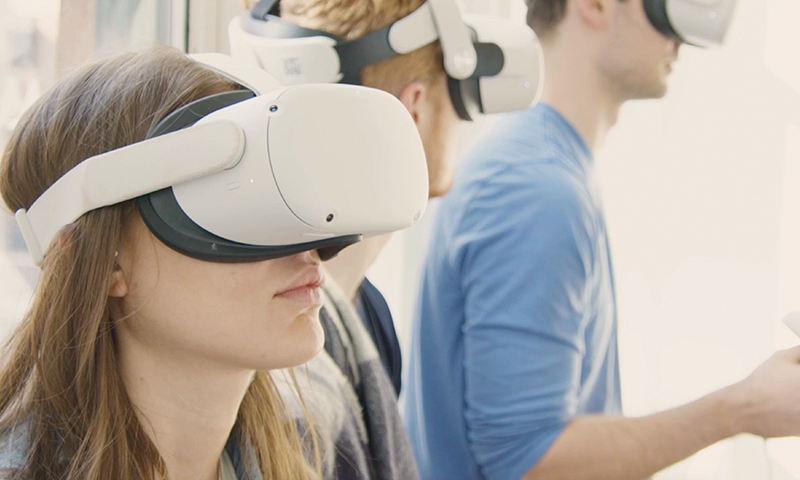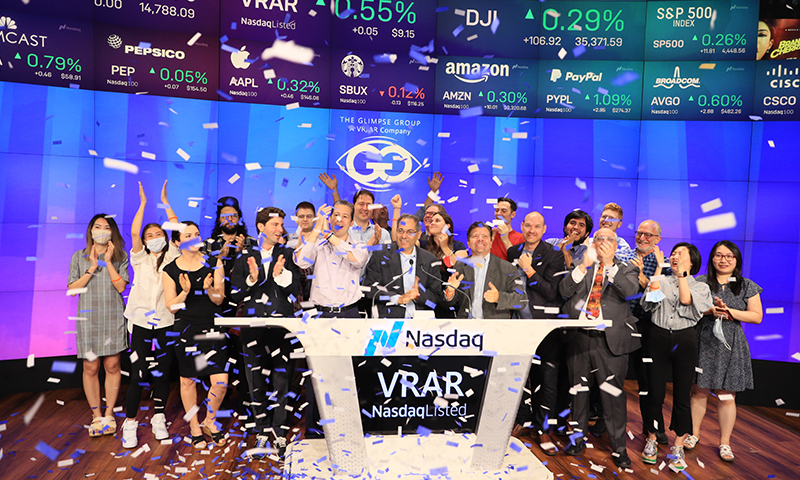Lyron Bentovim is the Co-Founder, President & CEO of The Glimpse Group, a Virtual Reality and Augmented Reality company. Founded in 2016, Glimpse is made up of several subsidiary companies all developing Enterprise focused VR and AR solutions for different industries (retail, healthcare, AEC, etc.) Lyron is a serial entrepreneur with over 25 years of executive experience in technology, strategy, and finance, he holds an MBA from the Yale School of Management.
In an exclusive chat with Digital First Magazine, Lyron Bentovim reveals the key trends to watch out for in the immersive technology sector over the next 5 years, his take on Metaverse and its commercial potential, professional background, and a lot more. Following are the excerpts from the interview.
In your opinion, how are new immersive technologies making a positive impact on enterprises?
Most enterprise use cases for immersive technology can be broken down into four buckets: Marketing, Learning & Training, Collaboration, and Visualization. Many businesses are beginning to use VR or AR in one or more of these four ways. For marketing, immersive technologies can create new and exciting engagement opportunities with clients and customers. Not to mention, positioning your company as an early adopter of new technologies keeps you ahead of your competitors. Learning & Training is one of the most popular applications for VR and AR today, with plenty of studies proving that immersive tech accelerates and improves onboarding, soft skills and technical training providing a better learning experience with stronger ROI.
Collaboration is an up-and-coming use case, as businesses recognize the value of immersion in collaborative projects, events, meetings and connecting with others. Finally, visualization was one of the first major uses for immersive tech: for example, visualizing information in VR and AR makes it easier to understand and improves our ability to work with it.
What will be the key trends in the immersive technology sector over the next 5 years and where do you see it heading?
There are two major trends I want to mention here. First, mass adoption of immersive tech is closer than ever, with VR headsets becoming increasingly affordable and accessible. Compared to five years ago, it’s now much easier for companies to order multiple VR headsets to equip their employees. Last year, for example, Accenture ordered 60,000 VR headsets for a company-wide rollout. This means we can expect to see more and more workplaces using immersive tech in the near future.
The second trend is more conceptual, but just as important. With immersive social experiences becoming more popular, we’re seeing VR as a whole transition from individual experiences into communal experiences. Social immersive experiences are the foundation of the metaverse, and although we’re still in the early stages of the metaverse, that’s one of the first things we’re beginning to see today. People are recognizing the value of connecting in immersive spaces, and as adoption continues to accelerate, we’ll see these social aspects of VR accelerate too.

What does ‘Metaverse’ mean to you? And why are more and more companies exploring the commercial potential of the Metaverse?
The Metaverse will be an immersive version of the Internet. Ultimately it will be a collection of immersive 3D worlds, where users will be able to connect, conduct business, socialize, shop and engage with one another. Many businesses already understand that creating a presence in the metaverse now will provide them with a head start on competitors as the Metaverse gains more traction. Improved client/customer outreach, immersive training for employees, virtual goods and services, and digital twins representing just a few examples of where businesses can benefit from immersive tech and the metaverse today. Nobody wants to be the company who refused to make a website or failed to understand the power of ecommerce or cloud computing in the 90s, so businesses are already developing their metaverse strategies and figuring out the best way to begin incorporating immersive tech into their workflow.
Can you tell us about your professional background and areas of interest?
My professional background is in tech and finance, as I’ve led multiple public and private tech companies prior to founding Glimpse. But ever since I was a teenager I’ve been an entrepreneur, and that’s ultimately what led me to co-found The Glimpse Group. I grew up during the previous Tech Cycle that started in the early 80s and moved us from the Analog era to the digital one. In 2015 I recognized that we were about to enter a new technology cycle based around immersive technologies and decided to start a company that will leverage the potential of this new technology cycle and address many challenges that companies face in the early stages of this cycle.
Currently, The Glimpse Group is NASDAQ listed. How long did it take you to be where you are now? Please walk us through your journey.
Going public was always the plan with Glimpse from Day 1. My experience with public technology companies allowed me to see the value there, so since our founding we’ve worked hard to create a business that will be attractive to public market investors. The name of the game is diversification: Glimpse is like a well-diversified investment portfolio, all rolled up into one company. Our subsidiaries are focused on multiple opportunities such as Marketing, Corporate Training, AEC, Healthcare, Education, Defense, and more. We built the company for years and when we saw the right moment to IPO, we pounced on that opportunity and IPOed in July 2021.

Tell us about The Glimpse Group’s core expertise and what sets it apart from other market competitors?
The main thing that separates Glimpse from our competitors is our diverse ecosystem of subsidiary companies. Each of our subsidiaries is a major player in their field, and all of them are experts in applying VR and AR in their particular industry. By bringing together Entrepreneurs and technologists across several sectors, we’ve created a wide base of knowledge and expertise which our clients can benefit from. When a business comes to us looking for a solution, we know how to apply immersive tech effectively for their particular business and needs. This is what has allowed us to become one of the largest independent software and services companies in the immersive tech sector today.
In today’s fast-evolving business environment, why should CEOs pay more attention to VR/AR? And in what ways can VR/AR benefit their companies?
The fact of the matter is that the world is moving from the digital era to the immersive era. This transition is accelerating, and businesses need to pay attention and prepare their strategies for this. I’ve already mentioned the specific benefits of VR and AR for businesses above, but as a general rule it’s crucial for businesses to stay ahead of the curve. Your competitors are always looking for a way to get ahead, so your business needs to get there first by integrating immersive tech and planning for the metaverse.
As the President & CEO of The Glimpse Group, what is your vision for your company for the next five years?
Going public has opened up a lot of doors for Glimpse, and we’ve seen some major changes over the past year and a half. One of the biggest opportunities is in mergers and acquisitions: as a company that’s NASDAQ listed, we’re now able to acquire companies at a different level of development than we were pre-IPO. Our two most recent large acquisitions, Sector 5 Digital and Brightline Interactive, were already large companies in the immersive tech sector before they joined Glimpse. Now, they have the benefits of our ecosystem and our public listing, and we can scale together at an accelerated pace. We plan to continue organically growing our existing portfolio of companies as well as adding best of breed companies in the space in order to maintain our position as the leading independent software and services company in the immersive tech sector.

What are the “myths” that you would like to dispel about working with AR/VR technologies?
There are plenty of misconceptions worth debunking, especially around the metaverse. On VR and AR specifically though, the idea that these technologies are a fad is just plain wrong. Naysayers were claiming the same thing about websites and PCs in the last technology cycle, and look where that got them. It’s important not to buy into all the hype either – we like to keep a measured view at Glimpse – but immersive tech is the foundation of the virtual era which we’re rapidly approaching. Preparing your business for the ongoing transition into virtual worlds is necessary if you want to thrive in this new technology cycle.
On a lighter note, what VR experience do you fantasize about experiencing in your lifetime?
As the Metaverse evolves, it will include many worlds that will be created to allow us to be active participants. These worlds will range from historical worlds, such as ancient Greece or medieval England, to fictional worlds, such as the Star Trek or Star Wars universes. Part of why I’m looking forward to retirement is spending time playing a variety of roles in these worlds.
You have had an amazing career trajectory over the years as a leading entrepreneur, academic advisory board member, acting GM, adjunct lecturer, and numerous other roles. What is the secret mantra behind your success?
There is no single secret to success: to be successful you need to know where you want to go, form a plan on how to get there, and be willing to work hard and be creative in order to achieve your goals. It always helps when you find great people with a similar level of commitment, joining together and leveraging each others’ skills.






